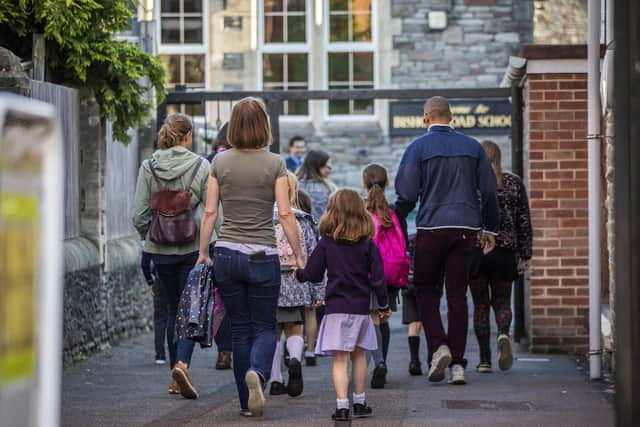Money worry for families as Lloyds reveals new school year costs parents £183.30 per child
and live on Freeview channel 276
For families that have two school-age kids, this means at least £366 is being forked out every year, as the summer draws to a close.
While kids have been at home, parents have been helping with lessons, with many sharing their wisdom on money management.
Advertisement
Hide AdAdvertisement
Hide AdTwo fifths (41%) reportedly used home schooling during lockdown to teach their kids about cash.


With kids returning to classrooms, Emma Abrahams, Head of Savings at Lloyds Bank, is encouraging parents to find opportunities to keep money lessons going.
She said: “Returning to school can be a tricky time for adults and kids, with the financial cost to families at £183.30 per child, according to our research.
"This time of year is a great chance to chat to children about the costs of going back to school and how parents manage these as summer starts to draw to a close.
Advertisement
Hide AdAdvertisement
Hide Ad"Little things, like asking kids to help with budgeting, can go a long way to building a healthy relationship with personal finances in the future.”
“I do find the ‘back to school’ time of year a financial worry.”
Claire Hildred who lives in Halifax with her daughters Isabelle (10) and Eva (9) works in customer services for a large landscaping company and spoke about the financial worries.
“I do find the ‘back to school’ time of year a worry financially, and each of my girls costs me around £100, in terms of getting all the bits they need to go back.
Advertisement
Hide AdAdvertisement
Hide Ad"When they were smaller it was easier, but as they get older, they are more picky about things like backpacks, lunchboxes and pencil cases. There’s also the general problem of trying to get the two of them back into the school routine – I start getting them to be more organised about a week before they actually go back – it helps to make it less painful on the first day.
"During the pandemic the routine side of things was probably the biggest issue and, as I’m currently working from home I’m looking forward to not having to have one ear listening out for them all day long.
“Although they’ll both miss the holidays – Eva loves spending time with animals (we have a small petting zoo at home) and Isabelle loves the freedom of being able to do whatever she wants throughout the day – they both see the benefits of school.
"Eva loves art and getting stuck in with paint and clay and Isabelle is a PE fan, mainly because she gets to be outside. Although, if I’m being honest, Isabelle told me her favourite time of the day was lunchtime because nothing beats eating.
Advertisement
Hide AdAdvertisement
Hide Ad“Kids do start to talk and think about careers really early. Eva wants to be a vet and Isabelle would like to be a fashion designer. Both of them said they think these jobs would net them about £10,000 a year. Doing something they love seems to be their main goal at the moment, as they also told me they think social media influencers earn about £20million a year!”
Lloyds Bank useful hints and tips to introduce kids to money management
Encourage the savings habit from a young age: Use a piggy bank or savings jar to make savings fun.
Give them some pocket money: Teach children to manage their money by giving them a regular income from pocket money in return for doing chores.
Advertisement
Hide AdAdvertisement
Hide AdOpen an account: This will help children understand about spending and saving, interest and how to manage an account.
Talk to your children about bills: When you receive bills, this can be an opportunity to explain all the different things that cost money, and how you use your earnings to pay for it.
Get them involved in managing the family purse strings: Taking kids to the supermarket, and getting them involved, helps build an appreciation of the cost of everyday items.